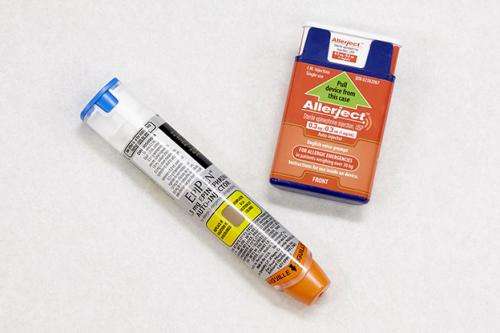Allergists to study epinephrine auto-injector program

McMaster researchers will be following a pilot project being launched in Hamilton's Jackson Square shopping mall to make epinephrine auto-injectors (EAIs) available to the public.
As part of the project, security guards have been trained to identify the symptoms and signs of anaphylaxis, the most serious form of an allergic reaction, and when and how to use an auto-injector (EpiPen and Allerject).
The research team, led by Dr. Susan Waserman, professor of medicine for the Michael G. DeGroote School of Medicine, will look at the efficacy of the training, use of stock epinephrine auto-injectors during the pilot project, and the knowledge of both consumers at risk of anaphylaxis and foodservice staff.
"We are excited to participate in this unique initiative - allergic reactions can happen quickly and prompt medical attention is paramount to reducing the severity of a reaction. Improved awareness can save a life," she said. The results of McMaster's research will be provided to the city by the autumn of 2015.
The pilot project has been spearheaded by the City of Hamilton, and involves McMaster, Anaphylaxis Canada, First Real Properties Limited which manages Jackson Square and their security staff, and the Rotary Club of Ancaster AM.
The project was inspired by the tragic death of a 12 year-old girl who succumbed to a likely anaphylactic reaction after consuming an ice cream cone purchased at a mall in Burlington, Ontario in 2013. It is estimated that approximately 2.5 million Canadians, about 1-in-15 people, have at least one food allergy, according to recent research. In the Hamilton area alone, up to 40,000 people are affected by food allergies. In addition to food allergies, there are many people who are allergic to stinging insects, medications, and latex.
"From this tragedy we hope to identify and implement practical measures to keep people with food allergies, especially children, safe and I am proud that we are the first city in Canada to undertake this important project," said Hamilton city councillor Lloyd Ferguson. "We have brought together well respected organizations with an expertise in research and training and leaders from the Hamilton community to make this happen."
Food allergy is a leading cause of potentially life-threatening reactions and a growing public health concern in Canada. Food-allergic reactions can happen anywhere, including in one's own home. When outside the home, however, risk factors increase as there is less control over one's food; others may not be familiar with allergen management practices such as reading food labels and avoiding cross-contamination during preparation and serving. Consider, in a 2011 Anaphylaxis Canada member survey, more than 30% of the 1,122 respondents said that they or their family member experienced an allergic reaction while dining at a foodservice establishment. Of these 337 individuals, about 68% (229 people) had alerted staff about their food allergies.
As there is no way of predicting how severe an allergic reaction may be and no known cure for food allergy, avoidance of allergens is the only means of staying safe. Individuals at risk must have epinephrine on hand in case of emergencies. Unfortunately, an underlying factor leading to fatal anaphylaxis, as shown by researchers worldwide, is the delay in administering epinephrine or not giving it at all. Early administration of epinephrine can reduce the severity of symptoms, improve an individual's outcome, and save lives.
Anaphylaxis Canada, contracted by the City of Hamilton, has developed a training program for mall security guards and senior staff in food courts and restaurants. The guards at Jackson Square have been taught to recognize the symptoms and signs of an allergic reaction and how to give epinephrine using "stock" or "undesignated" epinephrine auto-injectors. These devices are not prescribed for a particular person and may be used in an emergency to help individuals who are having an allergic reaction, who may not have their own device, or who may require an additional dose.
"While the ultimate responsibility to carry and know how to use epinephrine auto-injectors rests with individuals at risk or their parents/guardians in the case of young children, others within the community can play an important role in keeping people safe," said Laurie Harada, Executive Director of Anaphylaxis Canada and mother of a grown son with multiple food allergies.













